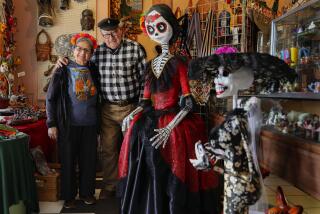A sad farewell for Dolores Westfall, whose ‘retirement’ was motoring from job to job in an RV
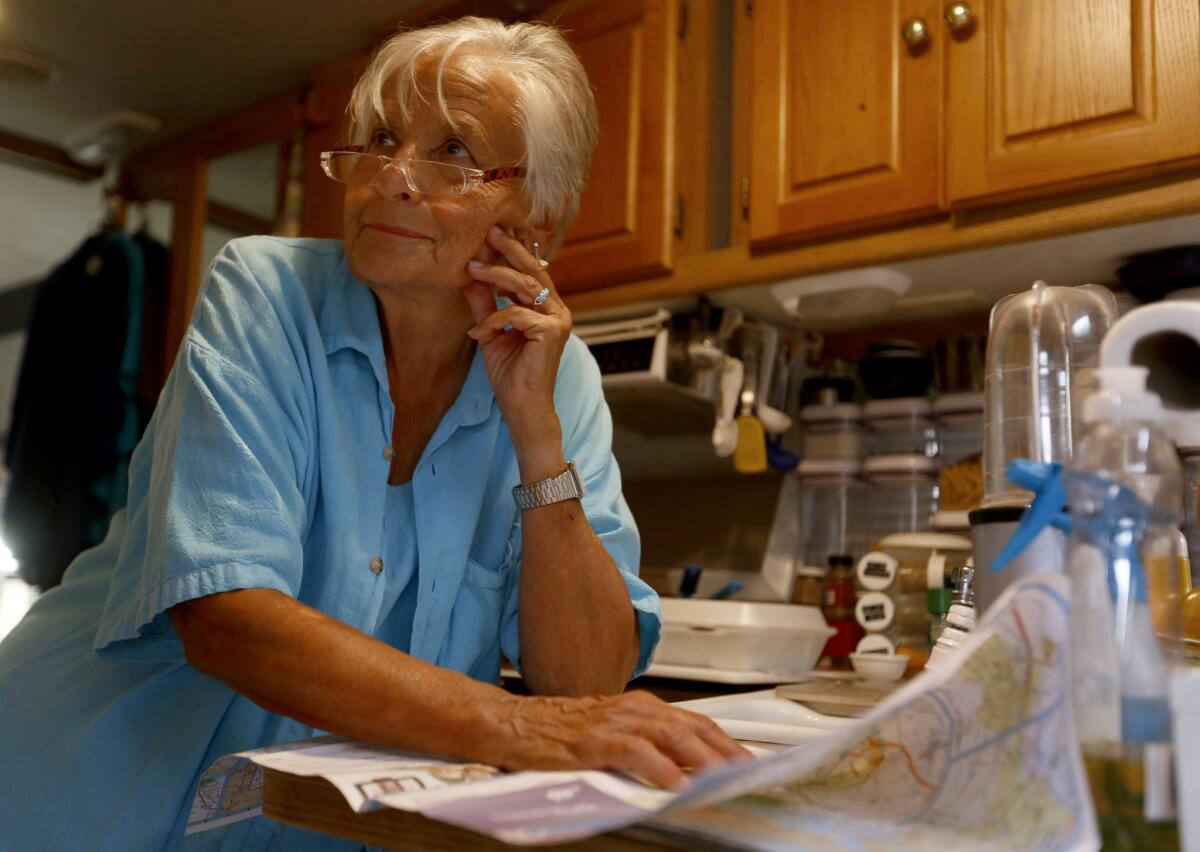
The desert isn’t for everyone — too hot, too bleak — but Dolores Westfall loved it. When my time comes, she once told her sister during a desert jaunt, spread my ashes here. Her sister promised she would.
The vow was kept earlier this month when Mary Ann Hoye took the ashes to a remote valley near the Nevada-California state line for the last stop on Westfall’s long and difficult, but also inspiring, life’s journey.
Westfall, a former bank secretary, museum curator and interior design consultant, had found herself reaching retirement age in the same predicament many Americans face these days: unable to make do on her $190-a-month pension and $1,200 social security check.
So she set out on an adventure born partly of choice, partly because there really was none. She spent her 70s traversing the country in search of temporary jobs, living and traveling in an RV she called “Big Foot.”
Over seven years, Westfall piloted Big Foot to 33 states to work all manner of temporary, low-paying jobs — Amazon warehouse clerk, saleslady, resort receptionist, cavern tour guide.
“I want to live life as much as I can, before I don’t have any,” she said.
Her story, chronicled by former Times staff writer John M. Glionna and photographer Francine Orr, felt achingly familiar at a time when many are pushing back their own retirements well past the age of 65.
As “Too poor to retire, too young to die” pointed out, nearly one-third of U.S. heads of households ages 55 and older have no pension or retirement savings and a median annual income of about $19,000.”
Westfall’s story, which appeared on Jan. 29, 2016, moved readers in a way few others have.
Part of the response was due to Westfall herself, whose quick humor and cheerful determination almost always eclipsed her predicament.
“Westfall — 5 feet 1 tall, with a graceful dancer’s body she honed as a tap-dancing teenager — is as stubborn as she is high-spirited,” Glionna wrote.
A man in Houston set up a GoFundMe account for Westfall, and donations exceeded $20,000. Thousands more came in personal checks. One reader, disappointed she couldn’t aid Westfall in person, helped a homeless person she encountered in her own hometown.
An email from a reader in Georgia was typical: “If she wants to come stay awhile and see if she likes Atlanta, I am offering free food, a free place to park Big Foot and I will pay for Bigfoot repairs. I have a wide array of friends who will also help.”
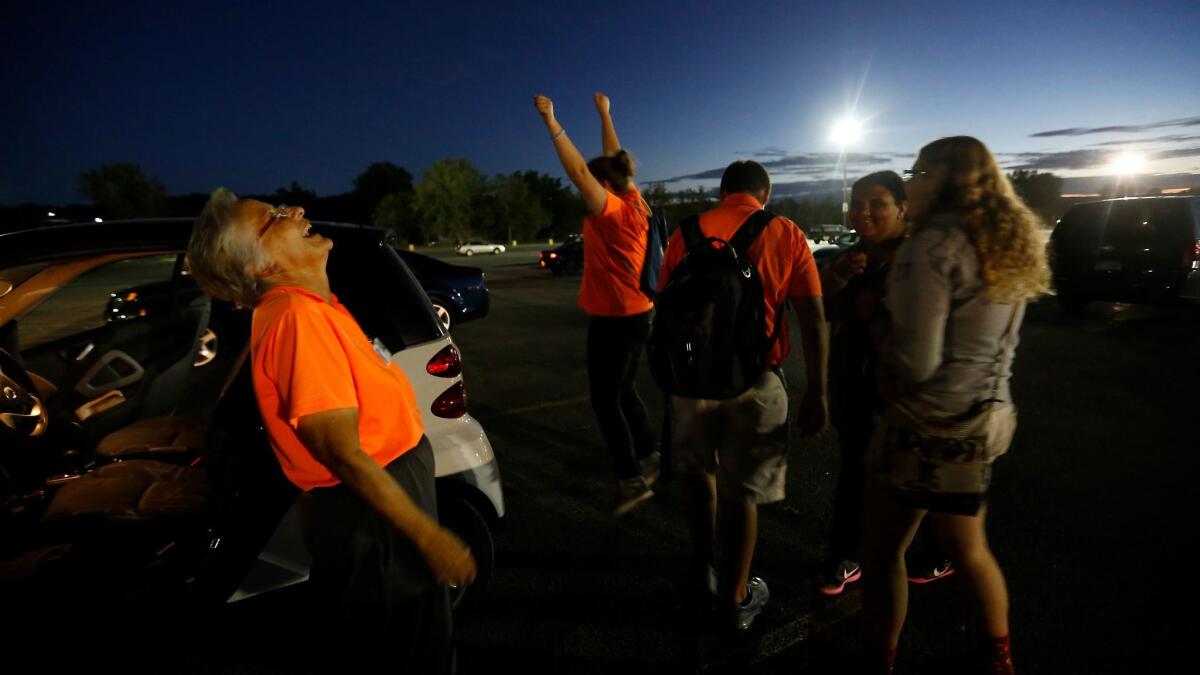
The article had caught up with Westfall in the spring of 2015 in upstate New York, where at age 79 she ran a kiddie ride at the Darien Lake theme park. She earned $9 an hour, and the job would only last into September.
Money was a never-ending worry. “I could just cry,” she wrote in her journal after a cop handed her a $300 speeding ticket. “I won’t have earned $300 in all of May. If I can get it lowered to $150, it will still be more than my entire grocery budget. Don’t know how I’m going to manage it.”
But she did. She persuaded a judge to reduce the fine to $150 and, as ever, looked for more bargains, or clocked more work hours, sometimes 12 a day.
When an abusive mother at the amusement park screamed at her over a perceived slight — “Just because you’re a miserable old lady with your effing $7-an-hour job! You don’t have a life!” — Westfall shrugged it off.
By late summer Westfall knew she needed dental work, but she also learned that she could take a guided tour of buildings in the area designed by her favorite architect, Frank Lloyd Wright. Each cost $100.
She picked Frank Lloyd Wright.
“I believe doing something fun, no matter how frivolous it might seem, is food for the soul,” she said. “You need to feed yourself some pleasure once in a while to keep feeling alive. Otherwise, it’s just drudgery.”
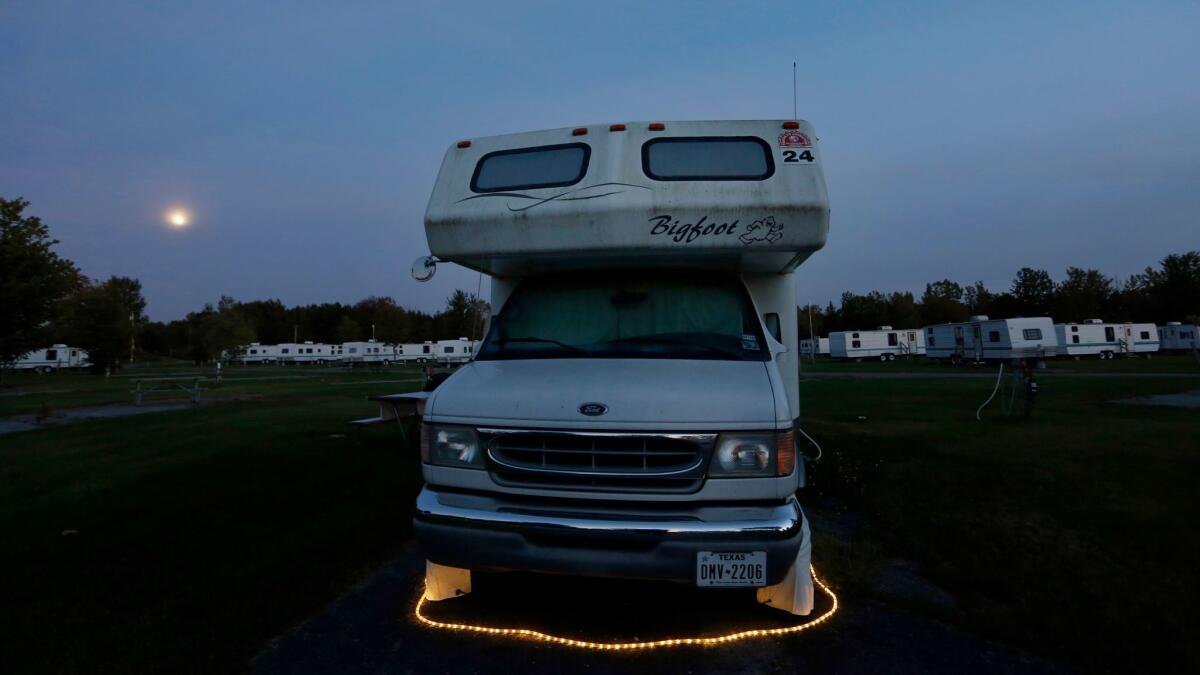
Westfall did not solicit donations, and was stunned by the reaction to, as she put it, “a story I couldn’t imagine anyone would want to read.” It took her weeks to answer all the letters and emails. For the first time in years, she could shop for groceries without anxiety, though she continued to log each purchase to the penny.
Last fall, Westfall had planned to start driving from New York to Florida, where a job was waiting. But just before Thanksgiving, not long after her 80th birthday, she suffered a mild heart attack. Her sister, who hadn’t seen Westfall since she’d hit the road in Big Foot, flew from Berkeley to be with her.
Hoye noticed that Westfall had begun slurring her words.
Hoye had trouble directing emergency workers to Big Foot’s location in the countryside, but finally the ambulance arrived and rushed Westfall to the hospital. She’d had a stroke.
Upon her release, the sisters hatched a plan to drive Big Foot to California, but doctors would have none of that. A nurse let Westfall park the aging RV at her place while Westfall flew with Hoye to Berkeley to recover.
But on the flight to California, Westfall suddenly felt severe pain in the abdomen. Another ambulance, this time waiting at the San Francisco airport. Another hospital, this time with a grim diagnosis: Stage 4 metastatic pancreatic cancer.
Journalists are supposed to keep a professional distance from their subjects, but to Glionna and Orr, Westfall wasn’t just a source for a story. They had kept in touch long after the story ran. Orr visited Westfall in Berkeley, and was there at the moment in late December when Hoye told her dying sister that it was “OK to let go,” that “it will stop hurting soon.” Two days later, Westfall died.
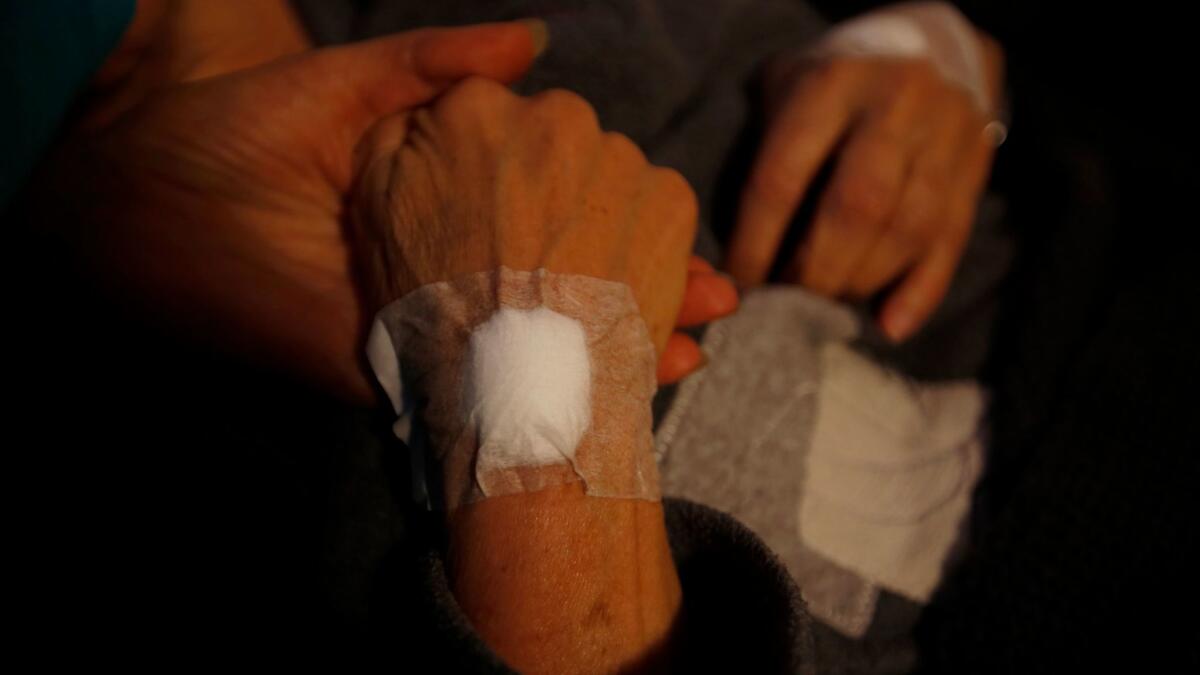
This month it was finally time to spread her ashes. Orr and Glionna joined Hoye and her husband, David, his daughter and her boyfriend in the desert — in a remote place where Westfall had taken solitary journeys as a much younger woman. Westfall hadn’t fully explained why the desert appealed to her, but perhaps it was the sense that a desert goes on forever. Boundless.
Hoye had brought a small bowl decorated with a heart and the word “love,” and, one by one, the mourners scooped up ashes and gently poured them on the desert sand and rock.
Then Glionna took the bowl and flung ashes high into the air, shouting, “Dolores!”
The others soon did the same, again and again. “Dolores! Dolores!” The ashes seemed to hang in the air ever so briefly, then the light wind caught them and they were gone.
Twitter: @StevePadilla2
ALSO
United apologizes — again — after attorney describes dragged passenger’s injuries
No signs of foul play in death of New York judge found in Hudson River, police say
After transgender bathroom battle, North Carolina looks to ban same-sex marriage
More to Read
Start your day right
Sign up for Essential California for the L.A. Times biggest news, features and recommendations in your inbox six days a week.
You may occasionally receive promotional content from the Los Angeles Times.

